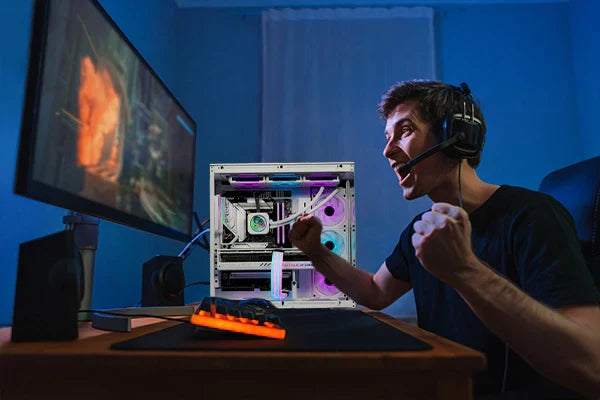-
My Cart: $0.00 0
My Cart
0 ItemsYour cart is empty
Subtotal :$0.00 USD
How to Test Your Gaming PC Performance Like a Pro?

In 2025, PC gaming has become an obsession, not just for young gamers but also for seasoned pros. However, many users find that their PCs don't perform as fast as they'd like. This has become a major concern among gamers. Overheating is another issue that can seriously impact the gaming experience. That’s why understanding how to test your gaming PC performance is essential for every gamer.
Whether you built your gaming rig or bought a prebuilt one, checking its performance ensures smooth gameplay.
In this blog, you’ll learn the best ways to test gaming PC performance by understanding key metrics, using top tools, and following step-by-step guidance. You’ll also discover how to optimize your system and resolve common performance issues.
Understanding Gaming PC Performance Metrics
Before testing, you need to know what to look for. Here are the most important gaming PC performance metrics:
● FPS (Frames Per Second): Measures how smoothly your game runs. Higher FPS = smoother gameplay.
● CPU & GPU Usage: This shows how much work your processor and graphics card are handling.
● Temperature: Overheating can slow down your PC or even damage parts.
● Latency & Response Time: Affects how fast your actions register in-game.
Keeping these in check ensures your gaming sessions are lag-free and enjoyable.
Best Tools to Test Gaming PC Performance
You don’t need to have costly tools. All you need is just the right software. Here are the best tools to test gaming PC performance:
Benchmarking Tools
● 3DMark: Tests overall gaming performance with detailed scores.
● Unigine Heaven: Checks how well your GPU handles high-quality graphics.
● PCMark: Measures general system performance, including everyday tasks.
FPS Testing Tools
● Fraps: A simple tool to check FPS in any game.
● MSI Afterburner: Tracks FPS, GPU/CPU temps, and usage in real-time.
Stress Testing Tools
● Prime95: Pushes your CPU to its limits to check stability.
● AIDA64: Tests CPU, RAM, and cooling performance under heavy load.
Monitoring Software
● HWMonitor: Keeps an eye on temperatures and power usage.
● NZXT CAM: User-friendly tool for tracking performance stats.
Step-by-Step Guide for Gaming PC Performance Testing
Now, let’s put these tools to work! Follow these steps to test gaming PC performance like a pro:
Step 1: Run Benchmark Tests
● Download 3DMark or Unigine Heaven.
● Run the benchmark and note your scores.
● Compare them with similar PCs online to see if yours is performing well.
Step 2: Stress Test Your CPU & GPU
● Open Prime95 for CPU testing and FurMark for GPU.
● Run them for 15-30 minutes to check for crashes or overheating.
Step 3: Check FPS in Your Favorite Games
● Use MSI Afterburner to monitor FPS while gaming.
● Compare your FPS with the recommended settings for your hardware.
Step 4: Monitor System Temperature
● Use HWMonitor to check CPU and GPU temps.
● Ideal temperatures are Below 80°C for CPU and below 85°C for GPU.
Step 5: Analyze Results & Optimize
● If FPS is low, adjust in-game settings.
● If temperatures are too high, improve Cooling (more fans, better airflow).
How to Optimize Your Gaming PC Performance?
Testing is just the first step; optimizing keeps your PC running at its best. Here’s how:
Adjust In-Game Settings
● Lower shadows, anti-aliasing, and textures for better FPS.
● Play at 1080p instead of 4K if your GPU struggles.
Update Drivers
● Always keep GPU drivers updated (NVIDIA GeForce Experience or AMD Adrenalin).
● Update the motherboard BIOS for better stability.
Overclocking (For Advanced Users)
● Use MSI Afterburner to safely overclock GPU for extra performance.
Warning: Overclocking can cause overheating if not done properly.
Improve Cooling
● Clean dust from fans and vents.
● Add more case fans or upgrade to liquid Cooling.
Common Gaming PC Performance Issues & Fixes
Even the best PCs have problems. Here’s how to fix them:
Low FPS
Fix: Lower graphics settings, close background apps, or upgrade RAM/GPU.
Overheating
Fix: Reapply thermal paste, add better Cooling, or improve case airflow.
Lag & Latency
Fix: Use a wired Ethernet connection, close bandwidth-heavy apps, or upgrade your router.
Wrap Up
Testing your gaming PC performance is the best way to ensure smooth, lag-free gameplay. By using the right tools, monitoring key metrics, and optimizing your system, you can get the most out of your gaming rig.
Want the best gaming experience without the hassle?
Visit TechnoidGamingPC today and explore the range of high-performance prebuilt gaming PCs, designed for pro-level gaming right out of the box.
FAQs
What’s the best tool to check FPS in games?
MSI Afterburner is one of the best free tools to monitor FPS, GPU/CPU temps, and usage in real-time. You can also use Fraps to create a simple FPS counter.
How do I know if my PC is overheating while gaming?
Use HWMonitor or NZXT CAM to check temperatures. If your CPU goes above 80°C or GPU exceeds 85°C, your PC may overheat, clean fans, improve airflow, or upgrade Cooling.
Can I improve gaming performance without upgrading hardware?
Yes! Lower in-game graphics settings, close background apps, update drivers, and optimize Windows for gaming. Overclocking (if done safely) can also boost performance.
How often should I test my gaming PC’s performance?
Test it whenever you install new hardware, notice lag, or update drivers. Regular checks (every few months) help maintain peak performance and prevent long-term issues.

 Canada
Canada


0 comments